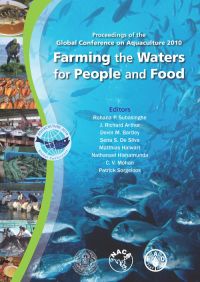Emergency regional consultation on acute hepatopancreatic necrosis syndrome
12 August 2012 | 48334 views | Health and Biosecurity, Shrimp, Thailand
An emerging disease known as acute hepatopancreatic necrosis syndrome has caused significant losses amongst shrimp farmers in China and Vietnam (2010), Malaysia (2011) and Thailand (2012). The disease affects both Penaeus monodon and P. vannamei and is characterised by mass mortalities during the first 20-30 days of culture, an abnormal hepatopancreas, corkscrew swimming, loose shells, pale colouration and slow growth. The cause is unknown at this time.
Considering the severity of the disease, NACA and the Australian Department of Agriculture, Fisheries and Forestry convened an emergency consultation in Bangkok, 9-10 August 2012, involving international shrimp health experts, regional governments and industry to share information on this emerging disease, its occurrence, pathology and diagnosis, and to develop a coordinated regional response to the issue. The recordings in this collection are the technical presentations made at the consultation.
Creative Commons Attribution.
